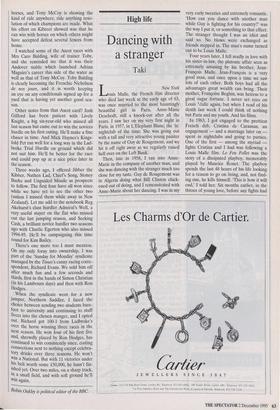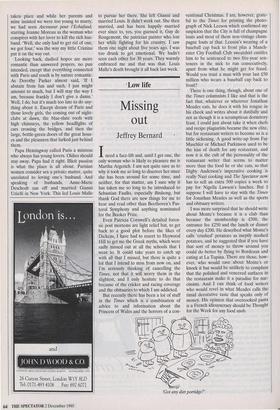High life
Dancing with a stranger
Taki
LNew York ouis Malle, the French film director who died last week at the early age of 63, was once married to the most hauntingly beautiful girl in Paris, Anne-Marie Deschodt, still a knock-out after all the years. I saw her on my very first night in Paris, in 1957, in L'Elephant Blanc, the 'in' nightclub of the time. She was going out with a tall and very attractive young painter by the name of Guy de Rougemont, and we hit it off right away as we regularly raised hell over on the Left Bank.
Then, late in 1958, I ran into Anne- Marie in the company of another man, and she was dancing with the stranger much too close for my taste. Guy de Rougemont was in Algeria doing what Bill Clinton chick- ened out of doing, and I remonstrated with Anne-Marie about her dancing. I was in my very early twenties and extremely romantic. `How can you dance with another man while Guy is fighting for his country?' was the way I put it, or something to that effect. The stranger thought I was an idiot and said so. No blows were exchanged as friends stepped in. The man's name turned out to be Louis Malle.
Four years later, I fell madly in love with his sister-in-law, the platonic affair seen as extremely amusing by his brother, Jean- Francois Malle. Jean-Francois is a very good man, and once upon a time we saw lots of each other. Both boys had all the advantages great wealth can bring. Their mother, Francoise Beghin, was heiress to a great sugar fortune. I never set eyes on Louis Malle again, but when I read of his death last week I could think of nothing but Paris and my youth. And his films.
In 1963, I got engaged to the prettiest French deb, Cristina de Caraman, an engagement — and a marriage later on spent in nightclubs and going to parties. One of the first — among the myriad fights Cristina and I had was following a Louis Malle film. Le Feu Follet was the story of a dissipated playboy, memorably played by Maurice Ronet. The playboy spends the last 48 hours of his life looking for a reason to go on living, and, not find- ing one, he kills himself. 'This is how it will end,' I told her. Six months earlier, in the throes of young love, before any fights had taken place and while her parents and mine insisted we were too young to marry, we had seen Ascenseur pour l'Echafaud, starring Jeanne Moreau as the woman who conspires with her lover to kill the rich hus- band. 'Well, she only had to get rid of one, we got four,' was the way my little Cristina put it on the way out.
Looking back, dashed hopes are more romantic than answered prayers, no pun intended, except that everything connected with Paris and youth is by nature romantic. As Dorothy Parker almost said, 'If I abstain from fun and such, I just might amount to much, but I will stay the way I am, because frankly I don't give a damn.' Well, I do, but it's much too late to do any- thing about it. Except dream of Paris and those lovely girls, the coming out of night- clubs at dawn, the blue-slate roofs with high chimneys, the yellow headlights of cars crossing the bridges, and then the large, bottle-green doors of the great hous- es and the pleasures that lurked just behind them.
Papa Hemingway called Paris a mistress who always has young lovers. Oldies should stay away. Papa had it right. Illicit passion is what the place is all about. Parisian women consider sex a private matter, quite unrelated to loving one's husband. And speaking of husbands, Anne-Marie Deschodt ran off and married Gianni Uzielli in New York. This led Louis Malle to pursue her there. She left Gianni and married Louis. It didn't work out. She then married, and has been happily married ever since to, yes, you guessed it, Guy de Rougemont, the patrician painter who lost her while fighting for his country. I saw them one night about five years ago. I was too drunk to get emotional. We hadn't seen each other for 30 years. They warmly embraced me and that was that. Louis Malle's death brought it all back last week.











































































 Previous page
Previous page